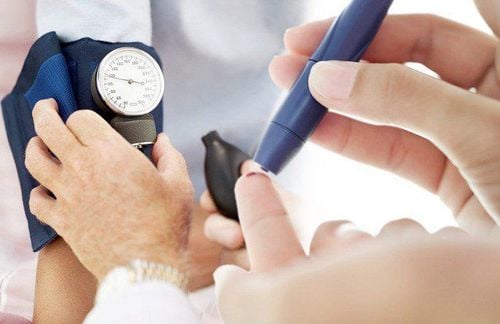This is an automatically translated article.
Renal failure is a dangerous complication in diabetic patients, stemming from the initial kidney damage and slowly progressing. The risk of kidney failure in patients with type 1 and type 2 diabetes is different.1. Risk of kidney failure in patients with Type 1 diabetes
Type 1 diabetes, also known as juvenile diabetes or insulin-dependent diabetes, usually occurs in children. For this type of diabetes, your pancreas does not produce enough insulin. Patients with Type 1 diabetes therefore have to take insulin injections for the rest of their lives.According to current statistics, about 30-35% of people with Type 1 diabetes (in adolescence) have kidney failure. In particular, diabetic glomerulopathy is a typical complication of insulin-dependent type 1 diabetes that occurs in people with diabetes at a very young age. The disease can also occur in patients with type II diabetes, but the incidence is not high.
However, diabetic nephropathy, in addition to glomerular damage, also has other lesions caused by diabetes itself in the kidney such as tubular damage or manifestations of calyces necrosis or bladder neuropathy. due to diabetes.

Tiểu đường Tuýp 1 thường xảy ra ở trẻ em
2. Risk of kidney failure in patients with Type 2 diabetes
Type 2 diabetes, which is more common and usually occurs in people over the age of 40, is called adult diabetes or non-insulin dependent diabetes.In Type 2, the pancreas makes insulin, but your body doesn't use it properly. High blood sugar can usually be controlled by following a healthy diet and/or taking medication, and some patients still need to take insulin. In this diabetic nephropathy, there is no increase in glomerular filtration rate.
Kidney disease is also a common complication of non-insulin-dependent diabetes mellitus (10 times more common than in other groups). According to current statistics, from 10 to 40% of people with type 2 diabetes (in adults) have kidney failure, 3-8% progress to end-stage chronic renal failure.
Diabetic nephropathy is thought to be the number one cause of chronic renal failure in western countries with prevalence ranging from 25 to 50%. Of which, more than 90% are type 2 diabetes.

Nguy cơ suy thận ở bệnh nhân đái tháo đường tuyp 2 cao hơn
3. Factors that increase the likelihood of kidney failure in patients with diabetes
Currently, in the US countries, the rate of end-stage chronic kidney disease caused by diabetes is high and increasing. Scientists have identified several key risk factors for which diabetic patients will develop kidney disease to develop kidney failure:Type 1 diabetes that begins before the age of 20. Control diabetes poor diabetes (high HbA1c levels). Poor control of hypertension. Family history of diabetes and chronic kidney disease. Have vision problems (diabetic retinopathy) or nerve damage (diabetic neuropathy) from diabetes. There is protein in the urine, obesity, smoking and increased serum lipids.

Kiểm soát đái tháo đường kém tăng nguy cơ dẫn tới suy thận
Currently, Vinmec Times City International Hospital has applied the technique of early kidney failure screening for diabetics by urine test L-FABP using Japanese technology on modern automatic AU680 testing machine. , for quick and accurate results, effectively supporting the diagnosis and treatment of diseases more effectively. Vinmec Times City is the first hospital to apply this new method in Vietnam.
To register for kidney function examination at Vinmec Times City International General Hospital. Health experts recommend that diabetics in general should perform regular kidney function tests to detect and screen for kidney failure early, and take appropriate treatment measures.
Customers can call Hotline: 0243 9743 556 or register online HERE.













